
*
Broadway playwright Theresa Rebeck, who created the NBC series, was let go after the first season, replaced by Safran, who oversaw the New York City-set (and shot) "Gossip Girl" on another network (that soapy series concluded in late 2012).
As ratings dipped in the February-to-May 2012 first season of "Smash," fans and critics grumbled that the show — which promised backstage intrigue surrounding the making of a Broadway musical about Marilyn Monroe — was focusing too much on the homelife of its playwright-lyricist character, Julia, played by Debra Messing. And too much on the worklife of mayoral press agent Dev (played by Raza Jaffrey), the boyfriend of rising star Karen, played by Katharine McPhee. (Julia's husband and Karen's boyfriend will be shed early in Season Two.) That was just the beginning of the criticism.
Others complained that characters behaved inconsistently from episode to episode, or that the musical numbers, while often gorgeous to look at and ambitiously shot and choreographed (with knockout songs by Tony Award winners Marc Shaiman and Scott Wittman), were sometimes not convincingly linked to story (a Bollywood sequence was arresting, but what was its point of view?). And theatre practitioners often rolled their eyes at the implausible professional behavior of the "Smash" showfolk — Megan Hilty's chorus-girl character, Ivy, wandering through Times Square in her show costume, for example.
But the buzz, negative and otherwise, seemed to prove that "Smash" was on to something, that a wide audience still believes that there's no people like show people — and that their stories are worth dramatic exploitation. Shedding hope that "Smash" is something dramatically sophisticated may be the secret to enjoying it. It wants to be a soap, not "The Jewel in the Crown." On a break from shooting Season Two in New York, Safran gave us a few minutes to talk about his passion for musicals and his approach to "Smash."
| |
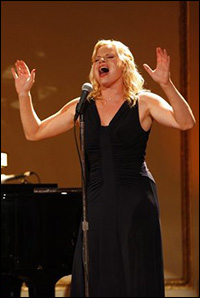 |
|
| Megan Hilty in Season Two of "Smash." | ||
| photo by Will Hart/NBC |
Joshua Safran: It is. You know, it was not initially produced that way. We didn't know it was going to be a two-hour premiere when we shot them. We just thought it was Episode One and Two. If we'd known, we'd probably have made it like a continuous timeline. Several weeks span over the course of two episodes.
Where are we at the top of the new season? Does it pick up right after the Boston tryout of Bombshell?
JS: The first hour of the premiere opens with closing night of Bombshell in Boston, and then we quickly follow our characters as they return to New York City, and the rest of the two-hour premiere kind of takes place the day they return through, like, a week — pretty much a week, week-and-a-half.
One of the things that was so accurate about the first season is that putting together a show does not happen overnight. There are obstacles.
JS: Right. Although I know a lot of people were upset about how accelerated it was last season, which I understand, but it's television. You don't have the luxury of following a show from its initial concept all the way through a workshop through production, which really could be five years. Here, in sort of "Smash" show-time, we kind of take it like a year-and-a-half, when you look back at it all — maybe a little bit under. This year, our goal was: we knew that the audience had already been on this journey of watching this show get to its out-of-town tryout, so we thought it might be fun to broaden the view and show more shows than just one this season, so that we could see the different stages of their process, and not feel like we were racing to get to Broadway.
| |
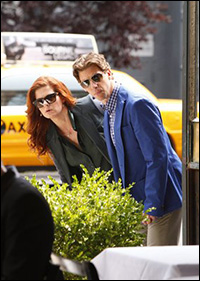 |
|
| Debra Messing and Christian Borle in "Smash." | ||
| Photo by Will Hart/NBC |
JS: Yes, absolutely. Being a major theatregoer myself, what I love so much is the variety that is on and Off-Broadway at all times. So the idea was to basically say, "Obviously the 'Broadway' of 'Smash' is not the actual Broadway, although we'll occasionally reference a show that exists, but why not this season take the chance to actually make more of that 'Broadway'?" Meaning, you'll hear about several shows playing at several theatres that we've invented — some of which, actually, I would really love to see. There was one in particular that I was like, "Oh, that would be such a good musical!"
Is that something you brought to the table, or was it a conversation between you and the other producers? What does Josh Safran bring, specifically, to this season?
JS: It's hard to say. As a showrunner, I have writers and I think the stories all sort of generate from there, but, of course, on this show, we have producers with such incredible theatre experience — like Marc and Scott, and Craig [Zadan] and Neil [Meron]. One of the things that will happen is, I will sit with them, and I'll ask for stories, and we'll talk about things. I've talked very extensively with Marc and Scott about the process of Hairspray and the process of Catch Me If You Can, and what was different about the two of them and what they felt like they learned from both of them, and what they felt they would do differently or not differently, and how the perfect alchemy for an incredible show that wins Best Musical comes together.
All of that is kind of amazing to have that at my disposal — that I can pick up the phone, if we come up with a plot and we're not sure it's possible, [and we can ask], "Is this something that actually happened?" Or, "Is there precedence for this?" I can call and get the answer. They know, which is incredible. So they're a very valuable resource.
Like I said, I'm a huge theatre fan. I went to [NYU] Tisch for playwriting. My professors were John Guare. I took classes — lectures — from anyone from Wendy Wasserstein to Jon Robin Baitz, who actually appears in one of the episodes this year. So like I have a little bit of a background in that [world].
| |
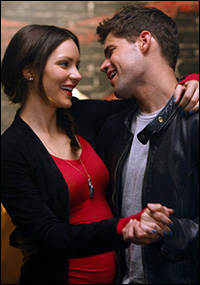 |
|
| Katharine McPhee and new Season Two cast member Jeremy Jordan | ||
| photo by Will Hart/NBC |
JS: Yes. I grew up in the city, and my mom was — musicals were sort of her favorite thing in the world. The first show that I was supposed to see was Pirates of Penzance, with Linda Ronstadt on Broadway — not at the Delacorte — and I got mono and couldn't go, and my entire family went without me, and I so upset, and I remember when PBS aired it, I got so excited because it was the one show that I definitely wanted to see. I think Edwin Drood became the first show that I saw — the original. So, yeah, they took me, and I fell madly in love with it. It's actually what I wanted to do, but I knew very quickly that I didn't have the musical acumen to do so, so I kind of went into just sort of writing, and I thought I would want to be a playwright, but then Hollywood beckoned, and unfortunately I accepted.
And you have a degree from Tisch?
JS: I was there for four years. It's a BFA. It's in playwriting. They call it Dramatic Writing, but I was on the playwriting track; I was not on the screenwriting track. I always thought it was strange that they didn't divvy them up, even though within Tisch itself — within the Dramatic Writing program — they are divvied up. You choose which one to follow, but in the end, it is Dramatic Writing.
Where in the city did you grow up?
JS: I grew up on the Upper East Side, which is the "Gossip Girl" side of me. And then ["Smash"] is now the theatre side of me.
Are you a big Sondheim geek?
JS: Oh, yes, absolutely!
Are you a cast-album guy?
JS: Oh, yeah, of course. I have so many bootlegs, which I shouldn't say, actually. But, yeah, collecting cast albums, and kind of knowing all the musicals that I can has been very important for me. I remember I had this incredible theatre teacher at Horace Mann, where I went [to school], whose name is Barry Siebelt, and he was probably the biggest inspiration to me. I remember, actually: he showed the PBS version of Sunday in the Park with George to us when I was 17, and that made me want to be a writer. That's what pushed me into writing, that's what pushed me to apply to Tisch — seeing that show. He was really instrumental to me. I mean, like he was the one who would play me [the cast album of] Bajour — stuff that is in my brain now that I never would have known if it wasn't from him, and it all sort of sprang from there. Now I have, like, 45 days of musical theatre on my computer. Isn't it amazing to think how our lives would be different if we hadn't encountered certain teachers?
JS: Absolutely. I owe so much to him, but, sadly, he passed away.
| |
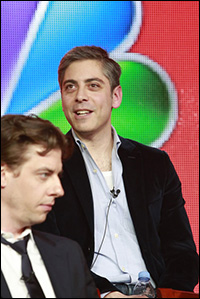 |
|
| Safran discusses the show at a January press event. | ||
| Photo by Ben Cohen/NBC |
JS: I did.
Did you view it as a fan or did you view it with a writer's mind, or can you separate that?
JS: I can't turn it off, it's true. It's hard for me to really let go and luxuriate in exactly what's happening, which is a standard problem in my life — not just watching art. But I was able to enjoy it because I thought it was so incredibly well made, and I thought Theresa [Rebeck] had created these characters that were so clear, which has been so incredible for me to be working [on now]…to have these characters that are so clearly defined. They very much tell you what they want to do as opposed to you're sort of rooting around and hoping that you're going to find it.
So, as a fan, I was very drawn to the characters, and, of course, I was drawn to the music and the musical sequences. [Choreographer] Josh Bergasse is a genius. Everything that he does is just a complete honor to be in his presence and to work with him. And, Marc and Scott, who I was a huge fan of from well before even Hairspray. I mean, my memories of Marc's scores…! I remember — again, me as a slightly-on-the-theatre-geek side, the Harry Connick, Jr. first album that he had written a song for, and I always loved that song, called "Drifting." I try to bring it up with him, and he doesn't really want to talk about it. [Laughs.] Anyway, to watch their work last year, and to get put up for this job, and get this job and to be able to work with them has been crazy.
Of course, there were pieces [of the first season] that I felt like, "Okay, maybe this is more for personal-life story than for a theatre story," and I wanted to see more of the theatre story. I was kind of hoping…I'd be waiting for the focus to shift back to what's actually happening backstage or the creative process of working together. So when I got the job, my goal was to sort of take the light, maybe, and shine it a little bit more on the process and a little bit less on home life. But, that's not to say that personal life is not still very important. There's a line in the premiere where Julia says, "Shows are like families. Everybody knows everything." And, that's what it really is like. They're like these small microcosms where everyone is just together — every day, all day. So, if you're still going to tell personal stories, just make sure that they're personal stories that orbit that world or impact that world. And, I felt like last year, as the season progressed, there was a melding of those two, much better.
One of the things I loved about the first season was the depth of histories of characters — the interlocking histories of the show people, and certainly the history of composer Tom and…
JS: Tom and Julia! We go into that more this year, too. I mean, we very much are aware that they've been together 11 years by this season — ten years from last year. You'll hear about what they did before they met. You'll hear a little bit more about their career. One of the lines that got cut from the premiere — unfortunately, for time — was the notion that they actually have never won a Tony; they've just been nominated. It sort of percolates throughout the season, but I think that's also part of hearing more of their drive. [Their show] Heaven on Earth, which we saw pieces of last year, was sort of a very commercial success for them, but maybe wasn't the critical success that they've always wanted, and that Bombshell is their chance to have both. [That'] pretty much their drive at the beginning of this season. How much are you pulled in the two directions of "We have to speak to a general audience" and "We have to speak to a theatre-fan audience"? How accurate do you need to be about how the world of shows works?
JS: Well, that's the other great thing: The "world" is so crazy-dramatic on its own in the best ways, because you have deadlines and you have live audience reacting to what you're doing and you have auditions. Everything is such high-pressure and such high-stakes that there actually isn't much liberty that needs to be taken. All you really need to do is just make sure that you're looking at those things appropriately. We really do try to do everything we choose to do with as much accuracy as possible. Of course, it's television, so certain liberties have to be taken, just like last year with the acceleration of the storyline — how the show went from workshop to production so quickly. That's a liberty you have to take. It's not a reality show — even then, they take liberties, but it's not like a documentary.
Even in the real world of theatre, there are unlikely realities. There's the famous story of Wonderful Town being written in six months...
JS: Right…and that's what you sort of draw upon. Tte other thing, too, which is very important, is that [NBC president] Bob Greenblatt is a Broadway producer. So, not only do you have Craig and Neil and Marc and Scott, you have Bob. It's pretty much a team of people who make musicals. So if the writers are like, "We really wish that we could put these two things together and make this story," somebody will catch it and be very helpful with: "Okay, that kind of can happen, but it has to actually kind of happen in this way for it to be realistic."
| |
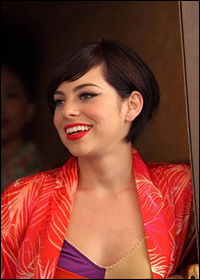 |
|
| New Season Two cast member Krysta Rodriguez. | ||
| photo by Eric Liebowitz/NBC |
JS: [Laughs.]
I don't know if we chalk that up to capriciousness on the part of the youth of the characters or if that was just loose shepherding in terms of the writing, with all due respect to Theresa. Did you sense that?
JS: There were definitely some inconsistencies, which I feel is common, actually, in a first-season show, which is still finding its footing. Actually, it's usually found the most in shows that are not airing while they're still in production. "Smash" was a mid-season replacement, so most of the episodes were actually done being shot by the time they started airing. When you're airing while you're still shooting, you have time to go, "Okay, well the audience maybe didn't love that aspect" or "They didn't love that character as much as we'd thought they would." We're kind of in a vacuum here with "Smash," which has positives and negatives. Looking at last season, that's the good thing of me coming in, in Season Two. It does give me the ability to have hindsight, which maybe I wouldn't have had had I been here from the beginning and known all of the reasons that made those decisions happen.
So we did try to, actually, yes, keep people to stick to one tone this season. So, one of the things that was important to me, is to make it clear that the ensemble [of a Broadway show] is a good thing and not something that everyone is desperately trying to get out of. So this season, for instance, Bobby and Jessica — [played by] Was Taylor and Savannah Wise — are in Bombshell's ensemble; they are happy to be there; they are not angling to do anything else; they are not trying to step over people to get better jobs. They are sort of our Greek Chorus, and they are the friends of other characters, and there is a consistency to who they are throughout.
How aware were you of the first season's fan response and criticism ?
JS: Well, I was an audience member, so I was very aware. I had the ability to go into the writer's room at "Gossip Girl," when everyone always would talk about what shows they watched the night before, [and] everybody was watching "Smash." So we would sort of have the conversations the next day. I'm also online a lot, so I was able to read a lot, and there were some things I agreed with and some things I didn't agree with, but, you know, we really sort of tried to listen and intuit what we feel is sort of right because you don't want to listen to everything.
For instance, some people really love Will Chase's character, Michael Swift, and some people had some issues with the plot there, and I think Will is incredibly talented, and I think he was amazing on the show, although this season doesn't start with his character in it, you never know because I believe that television is living and breathing — the door's always open. And, I felt like sometimes you just need to put some time and distance between that stuff, and it can fix itself as opposed to just immediately saying, "That character never existed. That plot never existed." It's not like that. Julia is very much dealing with [what happened] last year. Even though it was a plot that polarized people, we're not going to pretend that it didn't exist. In that way, we are listening to criticism, but we're actually trying to turn something that was maybe polarizing to something that can unify people.
| |
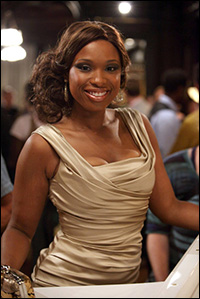 |
|
| Jennifer Hudson, a Season Two recurring guest star. | ||
| Photo by Eric Liebowitz/NBC |
JS: Absolutely. It does take a backseat a little bit because we have more original music this year than last year. As I'm sure you know, not only are Marc and Scott continuing to write amazing songs for this show, but we also have a group of younger, up-and-coming musical theatre writers writing some additional music, so we have a lot more original music. So the "covers" happen, but they only happen when they're organic. Sometimes there might be episodes without any, and other times, there might be episodes with more than one, but we really made sure this year to tie any pop cover to an emotion, and never just a stand-alone performance. Nobody gets up at a bar and sings, although I thought that Megan Hilty's version of "Crazy Dreams" last year was beautiful. We don't do that this year because we're trying to sort of maintain a more consistent tone in how the songs are used. So it's sort of more like [the films] "Pennies From Heaven" or "All That Jazz" in that it's sort of the internal feeling of the character happening in fantasy as opposed to just getting up and singing.
How did bringing new songwriters beyond Marc and Scott happen?
JS: I knew how much Marc and Scott were going to be contributing. They don't just write music for Bombshell, they write music for other musicals in the show this year, and other things as well. And, the feeling was, with Jeremy Jordan and Andy Mientus' [new songwriter] characters — Jimmy and Kyle — we definitely wanted a disparity in the sound. And, while Marc and Scott could very well — as you've heard in their music — write almost anything, the idea was, "Let's go as far apart as possible."
So the three of us, together, came up with this idea to go after these people whose sound is radically different and are basically a complete different vibe. But, occasionally Marc and Scott still do write music for those characters. It's not just this team of up-and-coming musical theatre guys who are writing songs for Jimmy and Kyle.
Can you talk about others? Who are they?
JS: Yes, of course. Joe Iconis, Drew Gasparini, Benj Pasek and Justin Paul, and sort of the wildcard of the bunch, Andrew McMahon, who has never written musical theatre before but he is a pop artist. His band is called Jack's Mannequin. Lucie Silvas is also a singer-songwriter whose music we are also using. She's not a musical theatre writer either, and her music came to me through Kat McPhee, who one day was just playing me songs that she thought were great and would be great for Jimmy and Kyle, and they were incredible…
I gather from what I've read that Frank and Ellis and Dev are not in Season Two, but you do touch on their stories. Do they remain in your pocket for the future?
JS: Yes. You know, Frank [played by Brian d'Arcy James] is in the premiere. Dev [Karen's boyrfriend, who slept with Ivy] and Ellis [the evil assistant] are both mentioned and dealt with. It's not like, as I said, we're trying to make it like this stuff never happened. As I said, Michael Swift is discussed as well. In my mind, the door's always opened. It is, in that way, a soap opera because it's an ensemble show with a cast of many characters, and you know theatre — somebody does a show, then they go into a pilot, then they come back to do a show, and suddenly they're back! New York City is a major character in this show. "Gossip Girl" was filled with New York City. Do you, as a writer, have a wish- list of places you'd like to use? Can a setting dictate a scene?
JS: You know, for "Gossip Girl" it could, because part of "Gossip Girl" is about the amazing restaurants that these kids would go to — but here, no. I would say because this show is so centered around musical theatre, our set pieces are our musical numbers, so that comes first. And, yes, it's great to shoot in Times Square, and it's great to shoot in actual theatres. This year, we shot a whole bunch of them — from the Lyceum to the Belasco. That, to me, is the biggest joy. There's nothing like being, for me, in one of these theatres when it's completely empty, and I can see every detail. I can actually take the time to walk around and look at these incredible works of art. That's where the setting would come first — these theatres. Yes, it would be great to shoot at these amazing restaurants, but what really matters most is the music.
You have guest stars who play themselves in the coming season. I know Liza Minnelli is doing it. Is she playing Liza or can't you say?
JS: Liza is playing Liza. But others are not necessarily playing themselves. Matthew Broderick is playing Matthew Broderick. Rosie O'Donnell is playing Rosie O'Donnell. But Daphne Rubin-Vega is not playing Daphne. Jesse is not playing Jesse. So, it's sort of a mix.
| |
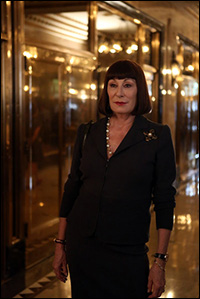 |
|
| Anjelica Huston as producer Eileen Rand. | ||
| photo by Craig Blankenhorn/NBC |
JS: It doesn't really happen like that. They hit a snag, I'd say, on the road to Broadway in the premiere, which you'll see, and that sort of sets everything up for the rest of the season, but the other shows aren't necessarily competition, so much as a widening out of our "Broadway" basically. Some shows are in competition, and others aren't. Like, in the premiere, you see a number from a show that Jennifer Hudson is in called Beautiful, which was last season's Tony-winning Best Musical, but you'll spend time there.
How did you help prepare your writers' room for Season Two?
JS: This season, [in preparation] we talked about "All That Jazz," we talked about "Carousel." I held a screening in the first day for the writers of both those films. We got an incredible print from Fox and "Carousel" because it's really hard to find an incredible print, and that was really beautiful. We also screened "Show Business," the documentary about the race to the Tonys and all the shows that were a part of it, and that sort of formed this line for the season — those three things together.
When you're working from your season outline, is there room along the way, episode to episode, for you to keep discovering stuff, to veer off and surprise yourself as writers?
JS: Oh, absolutely. You go down an alleyway that you weren't expecting that might take you someplace else, but the spine always stays the same: that's what you have to do in a serialized show, otherwise you do end up going down tangents that end up eventually hurting the characters. It's pretty locked and solid, but I definitely think they'll surprise me. There was an episode a little bit ago, where we did the whole thing in the writer's room, there was an outline, there was a script, everybody had read it, and we were just talking, myself and the writer one day. We were like, "There was something missing," so we invented an entire character that was not in it that is now fully in it. And you would never believe it if I told you that character didn't exist until like two days before we went into production! Things like that — but it didn't change the story. This world has so many amazing characters in it — whether it's publicists, orchestrators. Suddenly, you're like, "Oh, wait a minute. We should really see an orchestrator because we never met one before." This is the time to do it.
(Kenneth Jones is managing editor of Playbill.com. He penned The Smash Report, Playbill.com's weekly recap with commentary of the first season of "Smash." Here's the column about the season finale from last spring. Follow him on Twitter @PlaybillKenneth.)














































